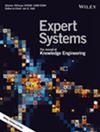A comprehensive survey on deep learning‐based intrusion detection systems in Internet of Things (IoT)
IF 3
4区 计算机科学
Q2 COMPUTER SCIENCE, ARTIFICIAL INTELLIGENCE
引用次数: 0
Abstract
The proliferating popularity of Internet of Things (IoT) devices has led to wide‐scale networked system implementations across multiple disciplines, including transportation, medicine, smart homes, and many others. This unprecedented level of interconnectivity has introduced new security vulnerabilities and threats. Ensuring security in these IoT settings is crucial for protecting against malicious activities and safeguarding data. Real‐time identification and response to potential intrusions and attacks are essential, and intrusion detection systems (IDS) are pivotal in this process. However, the dynamic and diverse nature of the IoT environment presents significant challenges to existing IDS solutions, which are often based on rule‐based or statistical approaches. Deep learning, a subset of artificial intelligence, has shown great potential to enhance IDS in IoT. Deep learning models can identify complex patterns and characteristics by utilizing artificial neural networks, automatically building hierarchical representations from data. This capability results in more precise and efficient intrusion detection in IoT‐based systems. The primary aim of this survey is to present an extensive overview of the current research on deep learning and IDS in the IoT domain. By examining existing literature, discussing mainstream datasets, and highlighting current challenges and potential prospects, this survey provides valuable insights into the prevailing scenario and future directions for using deep learning in IDS for IoT. The findings from this research aim to enhance intrusion detection techniques in IoT environments and promote the development of more effective antimalware solutions against cyber threats targeting IoT device systems.基于深度学习的物联网(IoT)入侵检测系统综述
随着物联网(IoT)设备的普及,包括交通、医疗、智能家居等多个领域都出现了大规模的联网系统实施。这种前所未有的互联水平带来了新的安全漏洞和威胁。在这些物联网环境中确保安全对于防范恶意活动和保护数据至关重要。实时识别和响应潜在的入侵和攻击至关重要,而入侵检测系统(IDS)在这一过程中举足轻重。然而,物联网环境的动态性和多样性给现有的 IDS 解决方案带来了巨大挑战,这些解决方案通常基于规则或统计方法。深度学习作为人工智能的一个子集,在增强物联网 IDS 方面显示出巨大的潜力。深度学习模型可以利用人工神经网络识别复杂的模式和特征,自动从数据中构建分层表示。这种能力可以在基于物联网的系统中实现更精确、更高效的入侵检测。本调查报告的主要目的是对当前物联网领域的深度学习和 IDS 研究进行广泛概述。通过研究现有文献、讨论主流数据集、强调当前挑战和潜在前景,本调查报告对物联网 IDS 中使用深度学习的普遍情况和未来方向提供了有价值的见解。本研究的发现旨在增强物联网环境中的入侵检测技术,并促进开发更有效的反恶意软件解决方案,以应对针对物联网设备系统的网络威胁。
本文章由计算机程序翻译,如有差异,请以英文原文为准。
求助全文
约1分钟内获得全文
求助全文
来源期刊

Expert Systems
工程技术-计算机:理论方法
CiteScore
7.40
自引率
6.10%
发文量
266
审稿时长
24 months
期刊介绍:
Expert Systems: The Journal of Knowledge Engineering publishes papers dealing with all aspects of knowledge engineering, including individual methods and techniques in knowledge acquisition and representation, and their application in the construction of systems – including expert systems – based thereon. Detailed scientific evaluation is an essential part of any paper.
As well as traditional application areas, such as Software and Requirements Engineering, Human-Computer Interaction, and Artificial Intelligence, we are aiming at the new and growing markets for these technologies, such as Business, Economy, Market Research, and Medical and Health Care. The shift towards this new focus will be marked by a series of special issues covering hot and emergent topics.
 求助内容:
求助内容: 应助结果提醒方式:
应助结果提醒方式:


